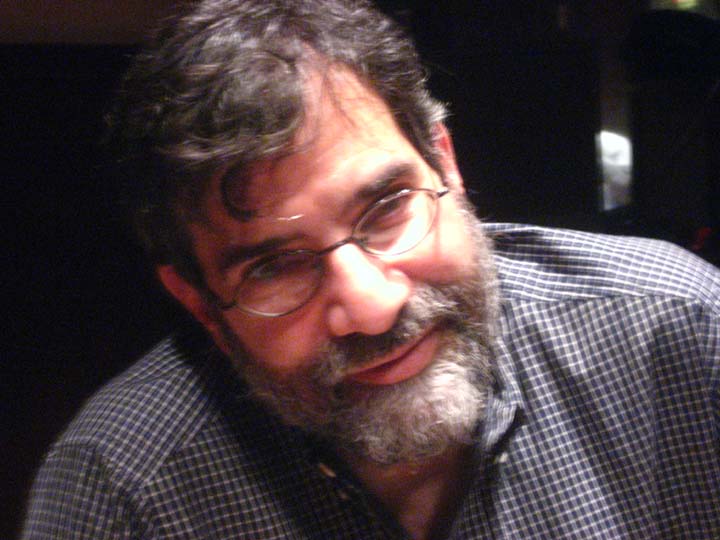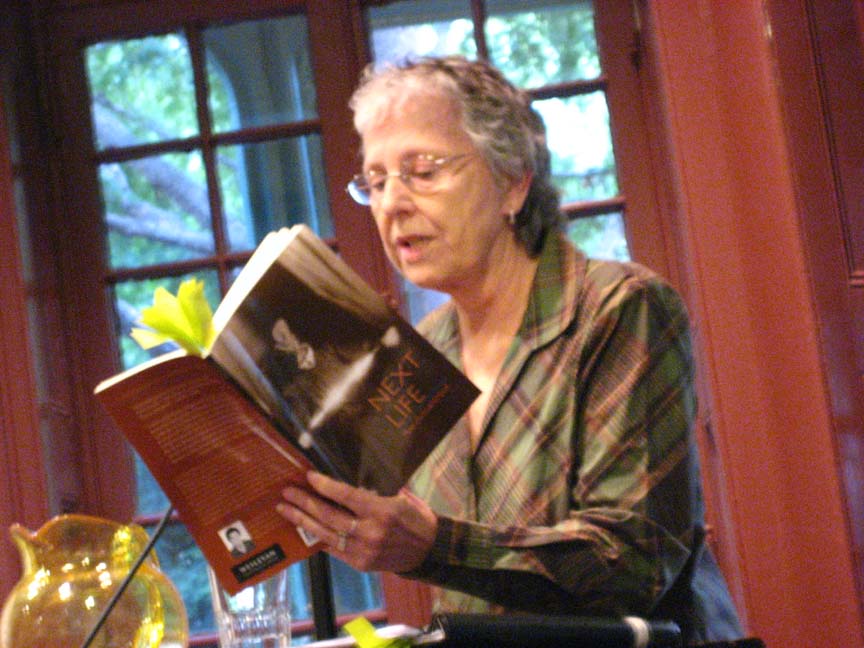Charles Bernstein
English 589 / Comp Lit 577
poetics seminar Spring 2014
Mondays at 7pm
The Pitch of Poetry
Please note: This syllabus has been adjusted to fit your screen.
Book order via Penn Book Center:
Louis Zukofsky: Selected Poems (Library of America)
Pierre Joris, Meditations on the Stations of Mansur Al-Hallaj (Chax Press)
*
on-line booksellers:
Bruce Andrews, Paradise and Method from on-line book sellers (new and used)
Reuven Tsur, What Makes Sound Patterns Expressive (new and used)
Optonal: Rae Armantrout volume;
but at start of semester, please email <alily at writing.upenn.edu>
to reserve a space at the reading, which will be during class time.
background image: Susan Bee, Doomed to Win (1983, 50 x 54")
1. (meet Weds., Jan. 15) Introduction

Robert Smithson, "A
Heap of Language" (1966); commentary by Richard
Sieburth
Deep background -- these are sets of reading I couldn't fit into the seminar this time around; I include it here as very optional background reading, which might be useful depening on your specific areas of interest These are two essays of mine which are Samual R. Delany : Burroughs File |
2. (Jan. 27: no class on Jan. 22) Blake/Dickinson

Blake: Songs of Innocence (1789) and Experience (1794), esp:
Innocence: Introduction, The Shepherd, Lamb, The Chimney Sweep, The Divine Image, Nurse's Song
Experience; Introduction, Nurse's Song, The Sick Rose (Bernstein recites), The Garden of Love, London, The Human Abstract
Ginberg sings Blake [cf: Nick's & Chris's posts, covers & versionings, cp: translation; Ashley on acoustic vs visual framing/cueing (cp Goffman above) and trasnposition (also in ED]
___ Grey Monk: recited by Bernstein
___ Marriage of Heaven and Hell, Proverbs of Hell(1790)
___ Jerusalem (1804, preface to Milton)
[cp the "Jerusalem" hymm as version cf Izzy's post: Blake as Mental Sleight, versioning as in ED's domesticated versions, cp The Raven versions next week]
Ault on Blake see recommended pages from Narrative Unbouond below.
Swinburne, William Blake: A Critical Essay, (1868)
Donald Ault: Visionary Physics: Blakes' Response to Newton (full text on-line) and Narrative Unbound: Re-Visioning William Blake's The Four Zoas (full text on-line; see esp. pp.xi-xv 3-6 (afterword separately on-line)
respondent: Tim
•
Emily Dickinson:
A Compiltation of Versions and transcriptions for several of the poems to be discussed in the seminar
I discuss "By homely gift" in a recent interview. I discuss "I would not paint" in Artifice of Absoprtion, linked above.
Further study:
Amherst mss.
Fascicle 16
ED ms pages
Susan Howe, "These Flames and Generosities of the Heart: Emily Dickinson and the The Illogic of Sumptuary Values" from The Birth-Mark
ED respondent: Caroline
[cf: Caroline and Julia on ED's versions, posthumous pub, intentionality; cP Lydia's to McGann's A Critique of Modern Textual Criticsm (see this syllabus); Mashinkina on ED as feminist icon and/or as visual artist, cf Smithson]
Further reading:
Howe's My Emily Dickinson: excerpt
respondent: Orchid & on
Sea and Spar Between by Nick Montfort and Stephnie Strickland
[cf: Chris on the ED's medium, Lucas on "uncontainable alterity" vs exceptionalism of visionary/genius in ACS and SH]
Marta Werner's "Radical "Scatters"; Dickinson fragments web site
Walter Benn Michaels, introduction to The Shape of the Signifier ("The Blank Page" intro – sections on Howe's "Sumptuary Values")
ED publishing history
Jean Osman, reading as X, from An Essay in Asteriks: pdf
Jen Bervin, Marta Werner, The Gorgeous Nothings: Emily Dickinson's Envelope-Poems
Amherst College collection (digital versions of all their holographs, including the envelope poems: a must!)
Dickinson Electronic Archive
Complete Poems (Johnson) in one html file (without varients) (restricted acces) (very large file); see also Little Brown edn at Scribd.
Guttenberg Project edition (Todd/Higginson first publication in three series) (series one, Boston: Roberts Brothers, 1890), series two, 1901, at Google Books)
Wiki version of complete poems
Barteby's Bianchi 1924 edn
PAL Johnson 1954 edn (but with no stanza breaks)
"Complete Poems" via "Given Randy" (but all centered)
ED Random Epigram generator (refresh to get new eprigram)
Susan Howe, My Emily Dickinson; listen to an early version, with discussion, on PennSound
Marta Werner's "Radical "Scatters"; Dickinson fragments web site
& her Lord letters site.
Jerome McGann, A Critique of Modern Texutal Criticm
Marta Werner, Emily Dickinson's Open Folios: Scenes of Reading, Surfaces of Writing
——, ed. Radical Scatters: Emily Dickinson's Fragments and Related Texts, 1870-1886 (digital)
Antoine Cazé , "’Tropic Show’; or, Dickinson's Heliotropes,“ The Emily Dickinson Journal 11.1 (2002) 33-48 via Project Muse
Domhnall Mitchell , "'A Foreign Country': Emily Dickinson’s Manuscripts and Their Meanings" available on-line from Legacy 17.2 (2000) 174-186 & see also his book Measures of Possibility: Emily Dickinson's Manuscripts
Werner/Bervin Harvard talk on YouTube
Sharon Cameron, Choosing not Choosing (Chicago, 1993)
"Considering the poems in the context of the fascicles, Cameron argues that an essential refusal of choice pervades all aspects of Dickinson's poetry. Because Dickinson never chose whether she wanted her poems read as single lyrics or in sequence (nor is it clear where any fascicle text ends, or even how, in context, a poem is bounded), "not choosing" is a textual issue; it is also a formal issue because Dickinson refused to chose among poetic variants; it is a thematic issue; and, finally, it is a philosophical one ..."
*
R.W. Franklin, ed. The Manuscripts Books of Emily Dickinson ( Harvard UP, Belknap Press, 1981).
On seriality vs sequence: Joseph Conte, Unending Design: The Forms of Postmodern Poetry
3. (Feb. 3) Poe, Emerson, Whitman

Emerson, The American Scholar (1837) [Mashinka cp Gramsci's organic intellectual, function of "oratiom"]
Emerson, The Poet (1841-43) [Isabel: Poe’s “beauty” and Emerson’s “truth", Lydia: "The question is not well defined."]
Emerson, Experience (1844)
Emerson, Self-Reliance (1841)
•
Whitman, "Respondez" (1867 version of "Poem of the Propositions of Nakednes" in the 1856 Leaves of Grass); Vaclav Paris essay on this poem (go to Arizona Quaterly and go to Volume 69, Number 3, Autumn 2013.
respondent: Caleb
•
Edgar Allan Poe
"The Poetic Principle" (1850) respondent: Lucas [Orchid: does his practice reflect his method; Tim: "the rhythmical production of soul-elevating effects in a melancholic emotional pitch. Several questions arise. How exactly is beauty created with rhythm? In other words, how is the melancholic tone of the beautiful work set by its rhythm? Or more particularly, how do we qualify the role of rhythm (as the distinguishing feature of poetry) in creating a tonal relationship between a work and its subject matter? Or, simply put, what is so melancholic about a rhythm? In short, how do we read rhythm? N.B. see sound reading below!
"The Raven" tr. Mallarmé and Baudelaire -- web display by Rogin Seguy: Robin will present;
"Philosophy of Literary Composition" Julia: metaphor, dénouement, incommensurabiliy betweeen Philosophy of Literary Composition"and "The Raven"
"The Bells"
"Annabel Lee": McGann recites [Chris]
"To Helen": McGann recites,
"The Raven": McGann recites, Rathbone, Vincent Price, James Earl Jones, translations (rec: first two French (1 and 2) and first Yiddish), Christpher Walken, Lou Reed, Gorin [Caroline, cp Poe's genious to Emerson's noncormity. Ashlery: Lenore/Nevermore/Echo]
Cf (via Orchid): Alan Parson's Project "Talkes of Mystery and Imagination" & (via Tim "The Lake")
Further Poe Readings:
Eureka: A Prose Poem
"The System of Dr. Tarr and Professor Fether"
"The Rationale for Verse"
Further Emerson readings:
Stanley Cavell, This New Yet Unapproachable America
Michael Magee, Emancipating Pragmatism: Emerson, Jazz, and Experimental Writing
Richard Deming, Listening on All Sides: Toward an Emersonian Ethics of Reading
Feb. 6: Trisha Low and Joey Yeargos-Algozin at 6pm at KWH
4. (Feb. 10) Gertrude
Stein: When This
You See Remember Me: pf

Man Ray photo 1922 (exact resemblance of exact resemblance)
seminar will focus on Tender Buttons and "If I Told Him"
respondent: Izzy, Lydia, Mashinka
Stein at PennSound
"Rose
is a rose" at 100 (1913)
Tender
Buttons at 100 (1914): new Perlow edn; Gutenberg; also: free Kindle, via print edition from Green Integer or Green Integer e-book; compare new Colin Sackett design (download pdf); pdf of first 1914 edition and transition 1928 pdf
"If
I Told Him: A Completed Portrait of Picasso"(1923) & audio / text alignment
"Composition
As Explanation"(1926)
"An Elucidation" (1927)
"Five
Words in a Line" (1930)
"Identity:
A Poem" (1935) (my commentary on this work)
Extensions (optional):
Stein in pictures.
from "Arthur A. Grammar" (1931)
Stanzas in Meditation (1932) & excerpts at PF
I have written several essays on Stein, collected here & see also my Three Compositions on Philosophy and Literature (1972), on Stein and Wittgenstein.
Melanctha from Three Lives:
anthology selections
"What Are Master-pieces and Why Are There So Few of Them"(1936)
Williams
on Stein
Note Stein resources also at MAPS.
Steve McCaffery. Every Way Oakly: Homolinguistic Translations of Gertrude Stein's Tender
Buttons (Toronto: BookThug, 2008). See one poem in L=A=N=G=U=A=G=E #6
Holly Melgard's procedure on Making of Americans (2012)
Mac Low and Eigner and Grenier etc on Stein in L= #6
Respondent: Chris
Brian Reed," Gertrude Stein Speaks" ESC [Englsih Studeis in Canada] 33:4, Dec. 2007 via Project Muse. ESC/Muse [Penn url]
Joshua Schuster on ms of Tender Buttons at Jacket2
Note Stein resources also at MAPS.
recommended:
Autobiography of Alice B. Toklas (1933)
Lectures In America (1935): "What Is English Literature," "Pictures," "Plays," "The Gradual Making of the Making of Americans," "Portraits and Repitition," and "Poetry and Grammar"
The Geographical History of America, or the Relation of Human Nature to the Human Mind (1936) Everybody's Autobiography (1937)
The Selected Writing, ed. Carl Van Vechten (Random House, 1946)
Gertrude Stein Reader, ed. Ulla Dydo
Gertrude Stein Selections, ed. Joan Retallack
Feb. 11 12-1pm
TOOLS-AND-TECHNIQUES IN THE DIGITAL HUMANITIES LUNCHEON SERIES Meyerson Conference Center, 2nd floor, Penn Library, with Chris Mustazza (from the seminar), Al Filreis and me. SIGN UP HERE.
Feb. 11 Katie Price and Steve McLaughlin reading at KWH at 6pm
Baudelaire originally planned for this seminar, is being moved to a discussion at the Philomanthean society (top floor of College Hall), to which you are all welcome. 7:45pm on Feb. 11. On Baudelaire -- and a good background reading for the modernist part of this class, I recommend Peter Nicholls's Modernisms. For a set of Baudelaire readings: to come. |
5. (Feb. 17) Charles Reznikoff

Charles
Reznikoff (1894-1976)
Amelia: A case study
this poem will be the focus of the seminar
respondent: Caroline, Izzy
•
SF State Reading: MP3
at PennSound
A selection
of poems (in Word); for class discusion, there is also
EPC selections
Holocaust reading and my commentary on the reading
respondent: Orchid
Zukofsky on Reznkikoff (1931): "Sincerity and Objectification"
"Reznikoff's Nearness" in My Way: Speeches and Poems; original talk (audio)
•
Collected Poems and Testimonry (vols 1 and 2) at LION (go to "Complete Contents" and "Reznikoff)
•
Secondary resources on Reznikoff:
-Daniel Listoe, “With All Malice”: The Testimonial Objectives of Charles Reznikoff " just out in Americal Literary History: go to Advance Access or then to first issue of 2014 when posted.
-Todd Carmody (recent Penn PhD), “The Banality of the Document: Charles Reznikoff's Holocaust and Ineloquent Empathy,” Journal of Modern Literature 32.1 (2008), 86–110.
-Stephen Fredman, A Menorah for Athena
6. (Feb. 24) Pierre Joris class visit


Nomad Poetics, via on-line book market
Meditations on the Stations of Mansur al-Hallaj (Penn Book Center)
respondent: Julia, Tim, Lucas
Joris at EPC; Joris home page
Joris at PennSound (start with Close Listening programs and see also Dec. 13, 2013, KWH talk)
Paul
Celan (& Gale bio):
Joris inro to Celan UC Press selections
Joris's Celan selection
"Todesfuge" audio
(and other poems); Rothenberg tr., & commentary
Sprachglitter (commentary)
Unrestricted
source for Celan sound files and poems
Charles Bernstein, "Celan's
Folds and Veils" (from Textual Practice 18:2,
2004) on
"Todtnauberg"
Joris on this poem
pdf: "The Meridian" (1960), "Conversation in the Mountains" (1959), Breman prize speech (1958), tr. R. Waldrop; (note the book)
(supplemental: outakes from the speech) & excerpts from the drafts.
Joris on Celan
Joris on Celan (YouTube of Harvard lecture)
Joris on Celan at KWH: right after Close Listening programs on his PennSound page
Celan reading (YouTube):
•
7. March 3: Bruce Andrews reading at 7pm at KWH; after the reading we will meet with Bruce in a seminar room at KWH. NOTE WE MEET AT KWH.
Bruce Andrews @EPC
PennSound (start with LINEbreak)
Paradise and Method from on-line book sellers
PROLOGUE for Andrews: Mario Savio's 1964 speech, Berkeley"free speech" movement
respondent: Orchid:
MONEY, 1985 by Henry Hills
& Radio Adios (1982)
PennSound: LINEbreak interview & transcript
The Poetics of L=A=N=G=U=A=G=E (2001)
"Love Song" #116 (mid-1970s)
Film Noir (1978): sample a few pages ...
Jeopardy (Awede, 1980)
from Live at the Ear: "I Knew the Signs by Their Tents" (1988): (5:43) text & ![]() mp3
mp3
The Millennium Project (c. 1990): sample a few pages ...
Mistaken Identity: #1 & #4 (The East Village, 2001)
SPRING BREAK: NO CLASS March 10
8. (March 17) Sincerity
and Objectifciation with Special Reference to Louis Zukofsky


perhaps we can start with any responses to Bruce Andrew's visit.
Louis Zukofsky (1904-1978) (links to my intro)
Selected Poems (LOA, at Penn Book Center)
respondent: Caleb, Tim (on Catullus), Mashinka
DLB (Scroggins) intro
PF
Poetry Magazine 1931 issue
"Sincerity and Objectification"(note there is a later far more condensed version of this essay that drops the references to Reznikoff -- see Prepositions, the collected essays).
"Songs of Degrees" (web library only) & audio:
Songs of Degrees: 2 and 3 (2:48): MP3
With a Valentine, the 12th of February (from "Songs of Degrees") (0:15): MP3
Songs of Degrees 1 & 2 and Barely and widely (2:13): MP3
With a Valentine, the 14th of February (from "Songs of Degrees") (0:37): MP3
"Julia's
Wild" (from Bottom: On Shakespeare, 1960)
Catullus & audio of
70
"A
Foin Lass Bodders Me"
LZ at PennSound
"Poem Beginning 'The' "(1927)
Al Filries leads a discssion of Anew #12 ("It's hard to see but think of a sea") on Poem Talk) (Text: Penn only)
First Half of "A"-9 (LZ source texts)
N.B. "Julia's Wild" comes from a line in Shakespeare's Two
Gentleman of Verona, Act 4, Scene 4 (line 199), a part spoken
by Julia:
Come, shadow, come and take this shadow
up
For 'tis thy rival. O thou senseless form,
Thou shalt be worshipp'd, kiss'd, loved and adored!
And, were there sense in his idolatry,
My substance should be statue in thy stead.
I'll use thee kindly for thy mistress' sake,
That used me so; or else, by Jove I vow,
I should have scratch'd out your unseeing eyes
To make my master out of love with thee!
respondent: Lydia
March 18 Ben Lerner at KWH at 6pm
March 19 Craig Dworkin at Temple
March 20 Pataphysics reading with Dworkin, Judith Goldman, Pierre Hugill, Michelle Taransky at 6 at KHW. Conference March 21 and 22.
9 (March 24): Al Filreis class visit
I think I'd like to try something pretty crazy. I'd like to talk with your graduate class about "first readings." What happens when one encounters one of these poems (poems of the sort being talked about, read and studied in your course) for the very first time. To that end, there will be no reading assigned in advance. I will bring with them four of five supposedly "difficult" poems and we will together try spontaneously to make a reading of them. No one will know poems till the day of ....
so while we have the week off from reading, some reflections on teaching:
Bernstein:
two essays on teaching
English 269 syllabus
Poem Profiler (and EZ)
Wreading Experiments list
Filreis:
Poem Talk
ModPo
English 88
Jerome McGann and Lisa Samuels on "Deformance"
10. (March 31) Riding / Baraka

Laura Riding
Laura
Riding (Poetry Foundation)
DLBintro
on
rencouncing poetry (Penn only)
Preface, "By a Crude Rotation" "Come, Words, Away" "Poet: A Lying Word" "The Wind, the Clock, the We" "The World and I" plus – bio and prose glosses: pdf Penn only
or go to E-resources and then to Granger's and then poem title
from The Telling
Riding audio
"Riding's Reason" in My Way: Speeches and Poems)
Perloff on Rational Meaning
further reading: Anarchism Is Not Enough and Contemporaries and Snobs
with Robert Graves. Survey of Modernist Poetry and Pamphlet against Anthogoies: pdf (Penn only)
respondent: Julia, Caroline ("Come, Words, Away")
Amiri Baraka (1934 -2014)
Gale intro
Larry Neil on the Black Arts Movement
Baraka
at PennSound
here's a brief selected from diff. periods, all from LION:
"Preface to a 20 Volume Suicide Note"
"Notes for Speech"
"Black Dada Nihilismus": MP3 & DJ Spooky mix) (fm Preface to a 20 Vol. Suicide Note, 1957)
respondent: Izzy, Nick
"The Politics of Rich Painters"
"Duncan Spoke of A Process"
"Political Poem" (PF)
"A Poem for Speculative Hipsters": MP3 (Dead Lecturer 1964) (PF)
"Black Art": MAP on the poem, performance
"Ka 'Ba",
"Poem for Half-White College Students": MP3 from Black Arts '65/'66
"It's Nation Time" (1970)
"Today"
"At the National Black Assembly" from Hard Facts (mid 1975)
Am/Trak (1979) audio
"Afro-American Lyric" (1979, frm Poetry for the Advanced)
"Lowcoup" (he later used "Lowku" "Blue Monk" from Funk Lore 1996
"Somebody Blew Up America" (2001) and YouTube, MP3
"The Academic Cowards of Reaction": MP3
Messerli selecton from Other Side of the Century
Further reading:
"Nationalism, Self-Determination and Socialist Revolution" (cf Revolutionary Communist League, Congress of Afrikan People
April 11 2pm-8pm: The Motion of Light: Celebrating Samuel R. Delany's Performative Poetics. Tributes to Delany to honor his contribution to Temple-Penn Poetics, with Fred Moten, Kenneth James, Terry Rowden, Holly Wilson, Ira Livingston, Jena Osman, and Robert Reid-Pharr, with a special message from John Keene. Organized by Charles Bernstein and Tracie Morris, who will host the event and toast the guest of honor. The celebration will begin with a screening of The Polymath or, The Life and Opinions of Samuel R. Delany, Gentleman, presented by the film maker, Fred Barney Taylor, and will conclude with a reading by Chip Delany. |
11. (April 7) Sound
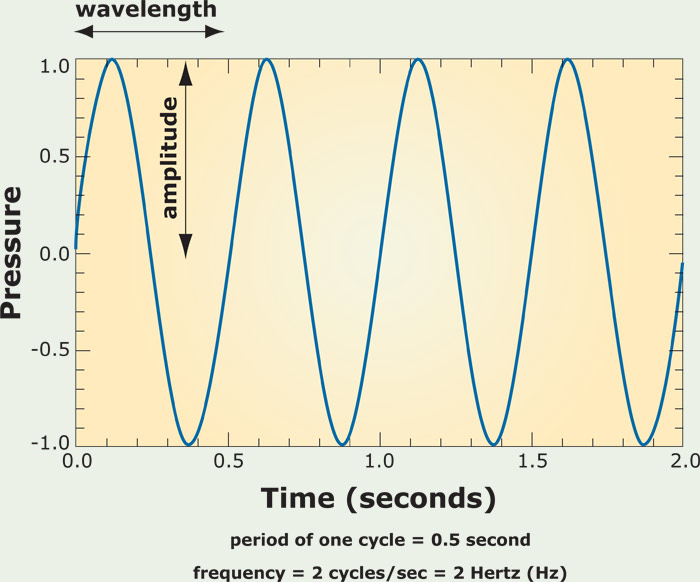
Respondents: Chris Mustazza and Danny Snelson, who will each post additional material to view before the seminar, They will be adding their own set of readings, this set will be background reading.
Mustazza's List:
Waveforms and optional collaborative exercise
Charles reading "1 to 100"
Filreis on Charles Bernstein's "1 to 100"
Mustazza on using ARLO
Perloff - "To Give a Design": Williams and the Visualization of Poetry
Mustazza - "The William Carlos Williams Band"
Jaap Blonk - "What the President Will Say and Do"
Vachel Lindsay, particularly "The Congo" -
OPTIONAL:
Mustazza - "Sound as an Extension of Form and Content: A Phonotextual Analysis of William Carlos Williams' "To Elsie"
Mashinka
Snelson's List:
----->Readings:
Jonathan Sterne, “The mp3 as cultural artifact” (condensed article form, see also (optional) MP3: The Meaning of a Format here) and “The Preservation Paradox in Digital Audio” (as part of the Sound Souvenirs collection)
Patrick Feaster, “Pictures of Sound: One Thousand Years of Educed Audio 980-1980” (important! for highlights, see Feaster’s YouTube lecture)
Charles Bernstein, “Making Audio Visible: The Lessons of Visual Language for the Textualization of Soun”
Craig Dworkin, “A Handbook of Protocols for Literary Listening”
Peter Middleton, “How to Read the Reading of a Written Poem”
----->Listenings:
William Carlos Williams, “The Defective Record” (text)
Tan Lin, “Eleven Minute Painting”
Gregory Laynor, “The Making of Americans”
Cassandra Gillig, “put me in charge of poetry magazine and i will fuck this country up”
Henri Chopin, “Civilisation de papier”
Timothy Leonido, “Callhome Corpus” and “Ingroup-signal (request)”
[Further resources: Sound Poetry Effects Catalog and The St.Claire Prof.Anon Micro-Library]
•
my list: further reading on sound ---
Susan Stewart, "Letter on Sound"(from Close Listening)
Reuven Tsur, What Mkes Sound Paterns Expressive (from on-line book sellers)
Andrew Welsh, Roots of the Lyric: available as an ebook via Penn
Stein and Waveforms, Tanya Clement
more Tsur:
•‘Kubla
Khan’ – Poetic Structure, Hypnotic Quality,
and Cognitive (short excerpt)
•Tsur, Phonetic
Cues and Dramatic Function Artistic Recitation of Metered Speech (alt.
site for same essay)
•Tsur, Poetic
Rhythm: Structure and Performance (note link to full book
below)
Tracie Morris: PennSound: Close Listening, &:
"Chain Gang" , "From Slave Sho to Video aka Black but Beautiful, "It All Started" (last of the segmented videos) & her article in boundary 2: American Poetry after 1975
Charles Bernstein: Close Listening intro
Recommmended:
See Sound syllabus
Garrett Steward: Reading Voices: Literature and the Phonotext (free ebook)
Donald Wessling, Chances of Rhyme (free ebook)
Marjorie Perloff / Craig Dworkin, The Sound of Poetry / The Poetry of Sound
Singing_Grove-Ency
Reich-Steve_Music-as-Process
Adorno_Music-Informal
12. (April 14) Robert
Creeley (1926-2005) (EPC page)
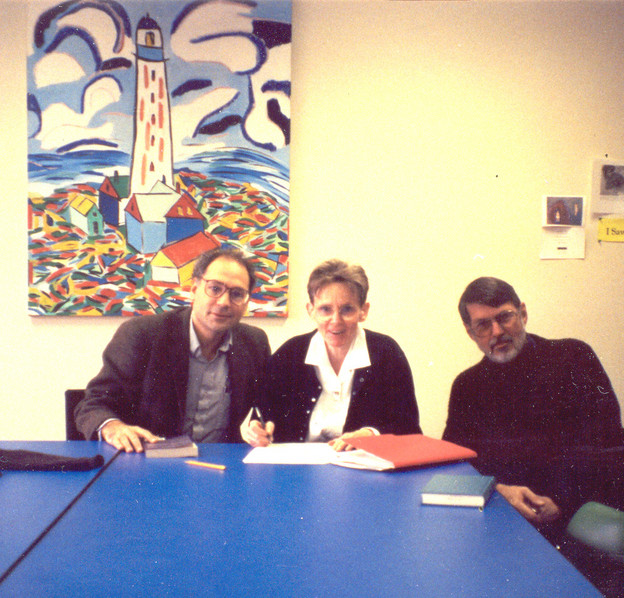
1992: Susan Howe, Creeley and me in my Buffalo office
<digital versions of Creeley's poems on LION via library e-resources (search author name)>
respondent: Caleb, Jack
My Creeley introduction/obit
Gale/DLB by Loss Pequeno Glazier
& 2 earlier piece of mine: "Hearing Here" & "Creeley's Eye"
*
Creeley Poetics:
"A Note"
"A Sense of Measure"
"Poems Are a Complex"
"I'm given to write poems" [also: pdf] respondent: Julia
Was That a Real Poem or Did You Just Make It up Yourself?
Extentions: Creeley on the commonplace
*
My Creeley selection at the Poetry Foundation:
& here is the audio for most of those:
A Token (0:19)
The Warning (0:23) (text)
"The Language": 1963 (U of AZ); 1965 (Berkeley Poetry Conference); 1975 (S-Press); 1984 (MLA, DC); 1986 (Germany)
The Measure (0:26)
*
"The Plan Is the Body"
Additional Creeley
Selection
*
Creeley PennSound:
LineBreak Program (my conversations with Creeley)
various readings of "I Know A Man": Brian Stefans flash version
Respondent: Chris
Oh No (0:36); & also Oh No (0:31): text
For Love (8:21)
The
Warning (0:15) (text)
A Tally (1:31); A Tally (1:33)
Words (0:47) :text
The Plan Is the Body (from Away) (4:30): text
Anger (6:10) text
The Hole (3:05)
A Piece (0:16)
A
Tally (1:33)
" 'Time' is some sort of hindsight" ... (from Pieces): text
13 . (April 21) Ashbery's The Skaters & Final projects
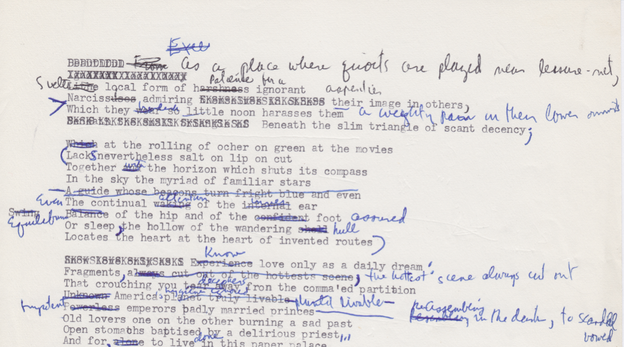
click image
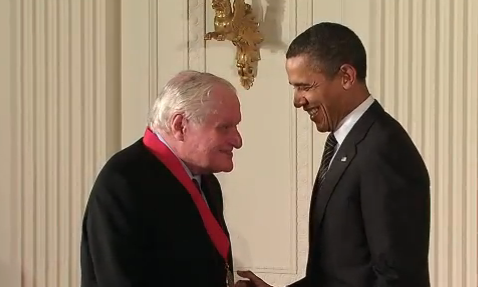
John Ashbery, Feb. 12, 2012 (receiving National Humanties Medal)
"The Skaters": A Case (and TEI) study
my essay on "The Skaers"
§§§§§§§§§§§§§§§§§§§§§§§§§§§§§§
Further reading/optional/background:
John Ashbery (1927 - ) (EPC page)
note extensive critical materials at Gale LRC, including intro
Poetry Foundation page
respondent: Lucas, Nick, Jack
*
Europe (via LION)
The Tennis Court Oath
"The Recital" from Three Poems, "A Wave" "Haiku": pdf
Paradoxes and Oxymorons
Chinese Whispers
"The Skaters"; Bernstein on this poem
*
Ashbery at PennSound:
"How Much Longer Will I Be Able to Inhabit the Divine Sepulcher..." (4:29): MP3; text (via LION)
Rivers and Mountains (3:57): MP3, text;
The Instruction Manual (5:28): MP3, text
"They Dream Only of America" (1:09): MP3; text (via LION)
text: "Daffy
Duck in Hollywood": audio: MP3
text: These Lacustrine Cities: audio: MP3
text: Soonest Mended: audio: MP3
text Farm Implements and Rutabagas in a Landscape: audio MP3; discussion
of the poem
text: And Ut Pictura Poesis Is Her Name audio: MP3
*
2011 Time magaine interview with John Ashbery
April 22: Laynie Brown and Lisa Jarnot at KWH at 6
14 Last Class (April 28) Rae Armantrout
We will go to the reading at KWH at 6:30pm on and then meet to discuss Armantrout's work after. You must confirm reservation made for this event, mention class and email alily==@==writing.upenn.edu
We will resume the class in an upstairs room at KWH -- where we will focus on final projects, continuation from previous week.
Optional: Buy an Armantrout book.
Archival pitch: Thinking in/around how a series of poets’ pitches – trajectories and calibrations – underwrites not just poems but possibilities for poetry. While the syllabus is still in progress (and subject to change and suggestion by participants), perhaps to start with Blake's illumnated Songs of Innocence & Experience, and move instanter on to –– on the one hand, Poe’s “The Poetic Principle” and several of his poems, works of Dickinson, Emerson’s “The Poet” and other essays, and Whitman’s “Respondez” –– and, on the other hand, Mallarmé’s Coup de dés and few poems of Baudelaire (and possibly considering Baudelaire’s and Mallarmé’s tr. of Poe). Seminar sessions will likely focus on sincerity and objectification with special reference to Charles Reznikoff, Laura Riding and her renunciation of poetry, orientalist images in modernist American poetry, John Ashbery’s “The Skaters” using the new Skaters website (with ms and digital tools), the poetics of Robert Creeley, Susan Stewart’s Poetry and the Fate of the Senses, the work of Leslie Scalapino, and also a session in/around PennSound (new approaches to working with sound files of poetry readings).There may be a philosophical interlude on/with Walter Benjamin. Plus seminar visits: Al Filreis on "first reading" situations (what might be called "the spontaneous attack of the difficult poems"), Bruce Andrews (Paradise & Method) on L=A=N=G=U=A=G=E and after, and Pierre Joris on his work and on Paul Celan, N. Afriacan anthology, and his own work.
